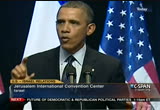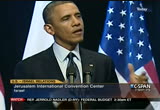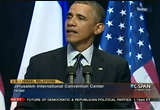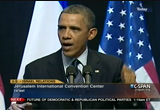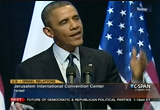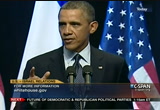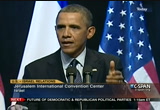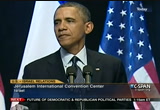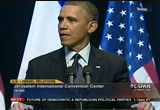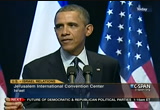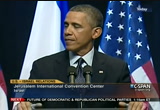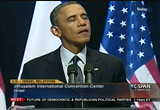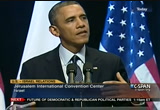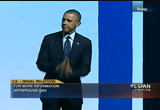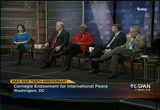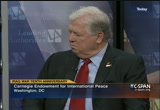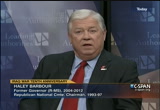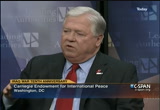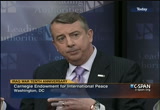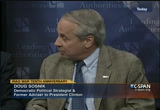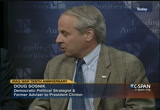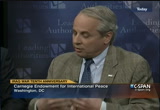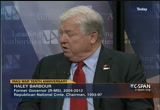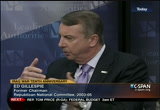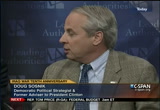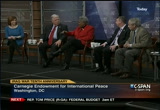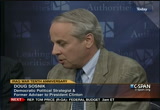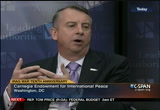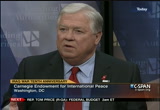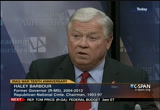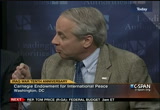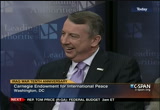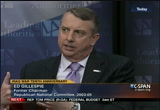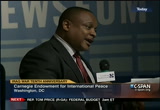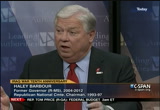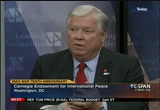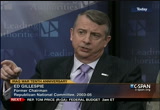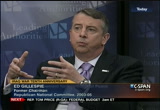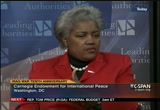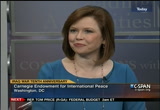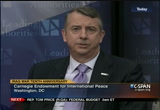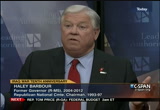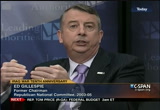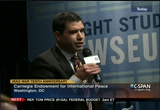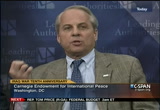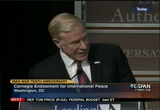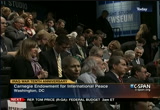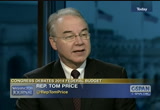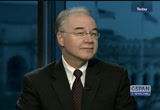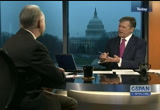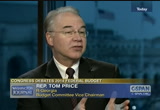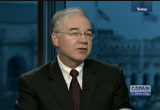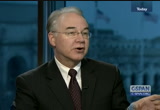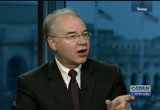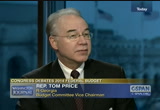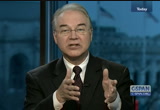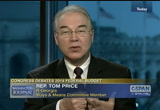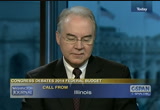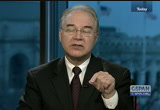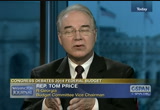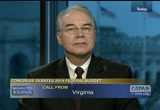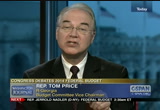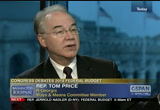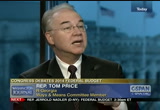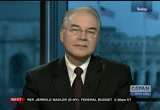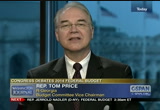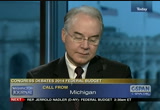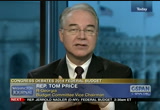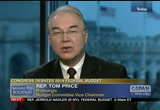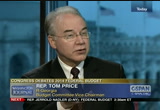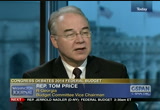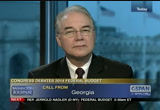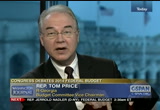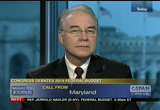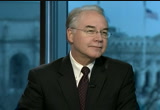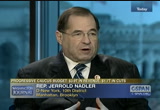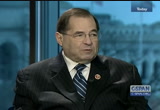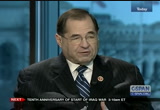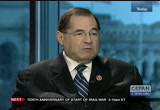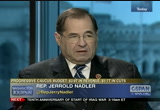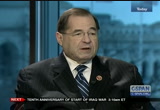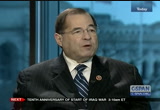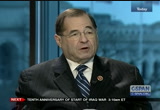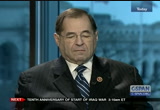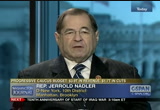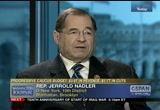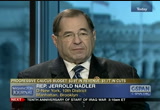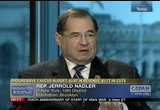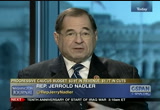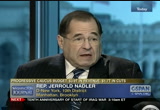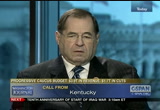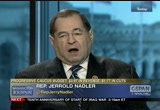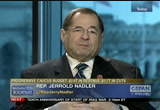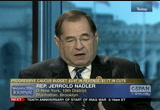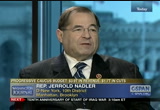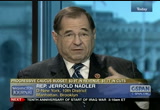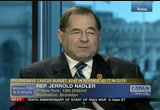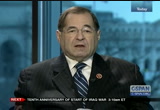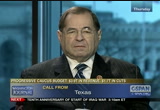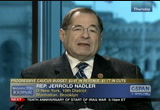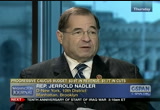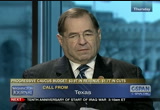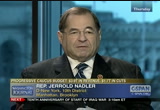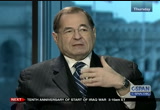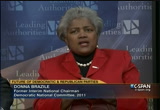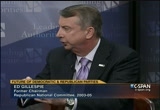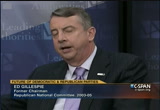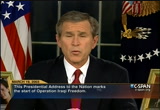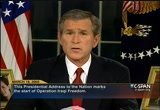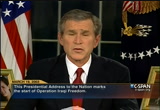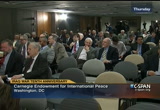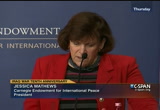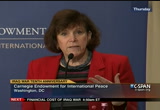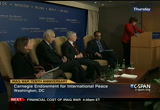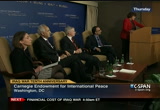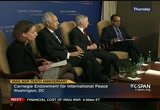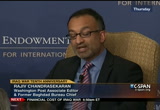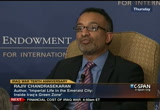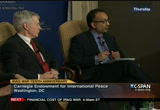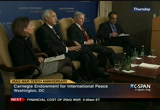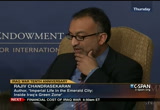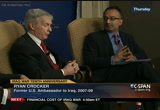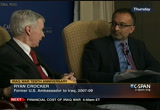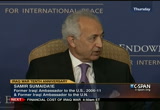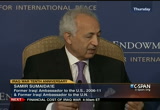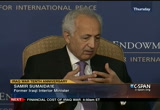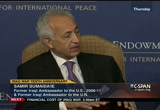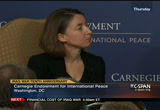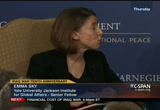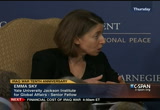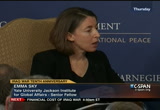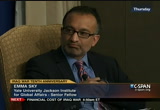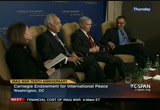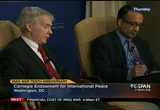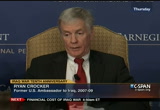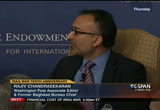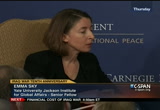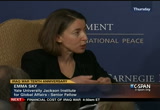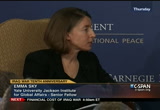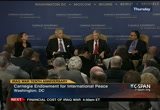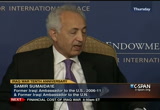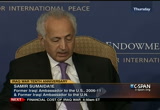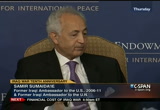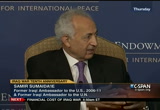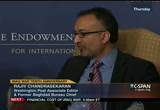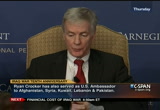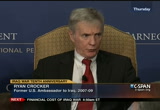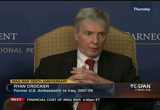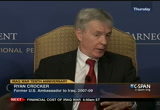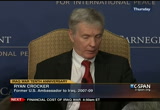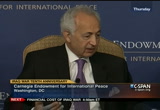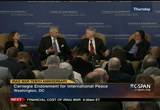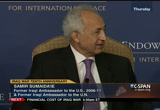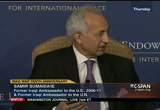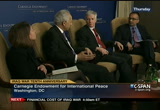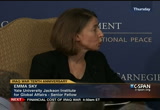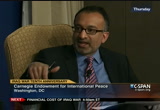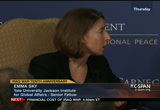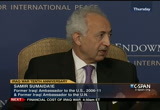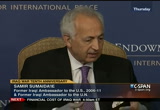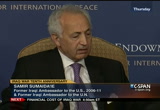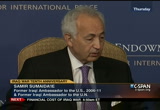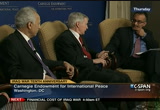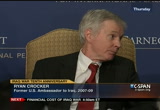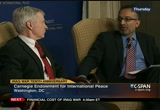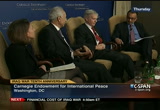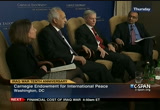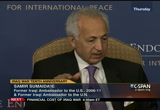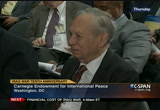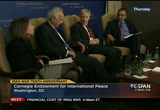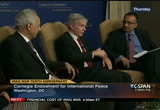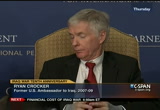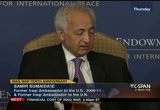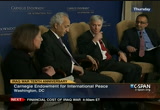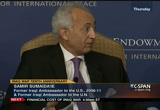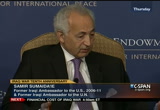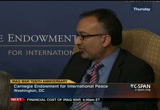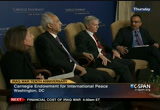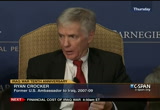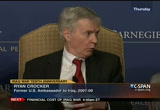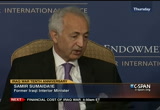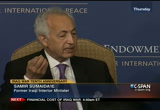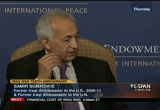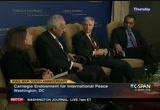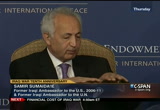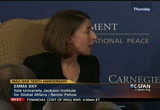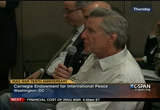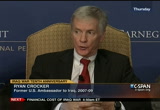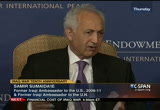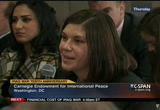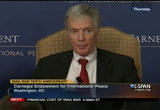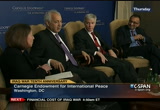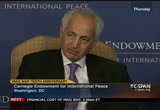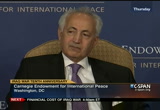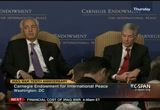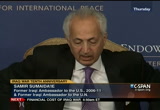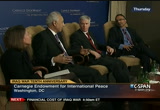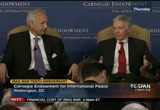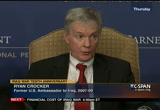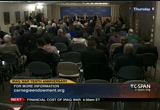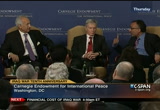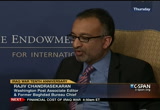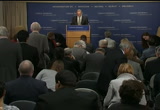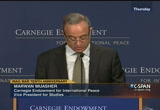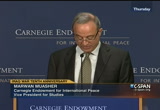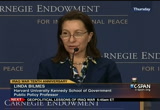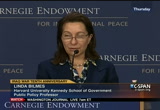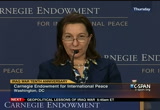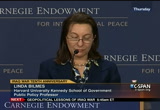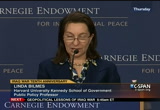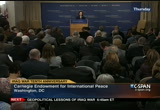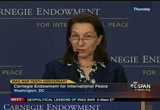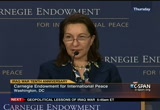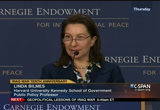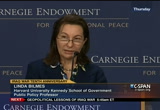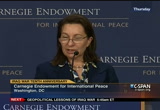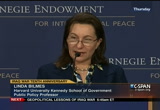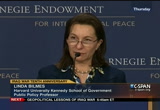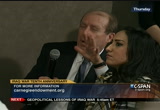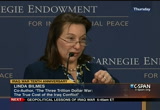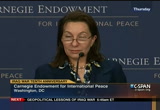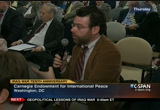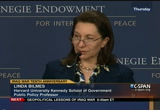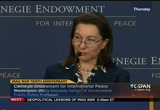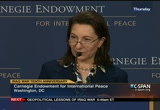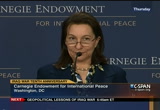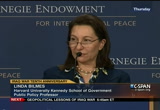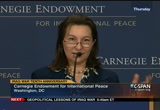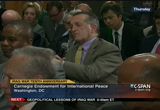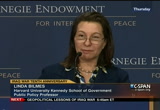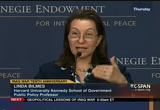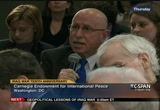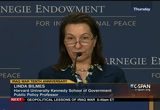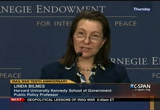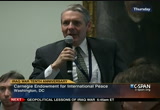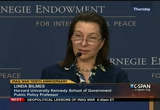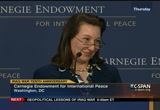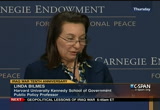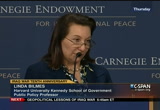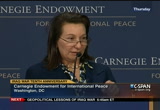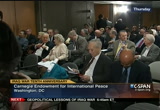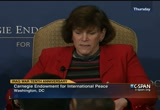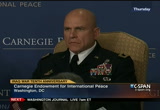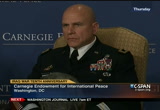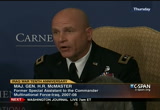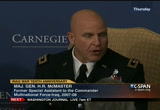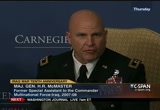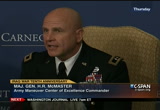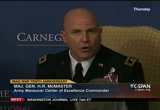tv Capitol Hill Hearings CSPAN March 22, 2013 1:00am-6:00am EDT
1:00 am
if we insist on fulfilling the ream in its entirety, we are liable to lose it all. [applause] [applause] or from a different perspective , i think of what was said after he lost his son. piece of no choice, he said, must be approach with the same determination and creativity as one approaches a war of no choice. [applause] israel cannot be expected to negotiate with anyone who is dedicated to its destruction. [applause]
1:01 am
i know you have had differences with the palestinian authority, i genuine believe you have a true partner in president of and the prime minister. i believe that. they have a track record to prove it. they have built institutions and maintain security on the west bank in ways you could have imagined a few years ago. many palestinians, including dumb people, have rejected violence as a means of achieving their aspirations -- haveding young people, rejected violence as a means of achieving their aspirations. peace is possible. [applause] i'm not saying it is guaranteed. i cannot say that it is more
1:02 am
likely than not, but it is possible. i know it does not seem that way. there will always be reasons to avoid risk. there are costs for failing. there will always be extremists who provide an excuse not to act. must be something exhausting about endless talks about talks and daily controversies and the grinding status quo. i'm sure there is a feeling to say, enough. let me focus on my small corner of the world and my family and my job and what i can control. but it is possible. ,egotiations will be necessary but there's no secret about where they must lead. two states for two peoples. [applause]
1:03 am
there will be differences on how to get there. there will be hard choices along the way. air of the states must adapt to a world that has changed -- air states must adapt to a world that has changed. now is the time for the arab world to take steps toward normalizing relations with israel. [applause] palestinians must recognize that israel will be a jewish state and that israelis have the right to secure their security. [applause] israelis must recognize that an
1:04 am
independent palestine must be pliable with real borders that need to be drawn. [applause] i have suggested principles on territories and security i believe can be the basis for these talks. , put aside the plans and the process. i ask you to think about what can be done to build trust between two people. four years ago, i stood in cairo in front of an audience of young people. they must seem a world away, but the things that they want are not so different from what the young people here want. makewant the ability to their own decisions and get a good job and worship god in
1:05 am
their own way and to get married and raise a family. the same is true of those young palestinians and met this morning. the same is true for those who you're in for a better life in for -- and those who yearn a better life in gaza. there is that sense of empathy that takes place among those who live together in this land and in this sacred city of jerusalem. [applause] let me say this -- i can promise you this, political leaders never take risks if the people do not push them to take some risk. must create the change that you want to see. [applause] ordinary people can accomplish
1:06 am
extraordinary things. i know this is possible. look to the bridges being built in civil society by some of you here today. look at the young people. aey have learned to overcome legacy of mistrust that they inherited from their parents. wey simply recognize that hold more hopes in common than the fears that drive us apart. --r voice is must be louder voices must be louder. look to a future in which jews and muslims and christians can all live in peace and greater prosperity in this holy land. believe in that. [applause] , let it be a future
1:07 am
you want for your children. in which a jewish democratic vibrant state is protected and accepted for this time and for all time. [applause] be many who say this is not possible. israel is the most powerful country in this nation. israel has a unshakable support of the most powerful country in the world. [applause] israel is not going anywhere. they have the wisdom to see the world as it is. this is in your nature. israel has occurred to see the world as it should be. -- current age to see the world as it should be. [applause]
1:08 am
in order to be a realist, you must believe in miracles. sometimes the greatest miracle does recognizing that the world can change. that is a lesson the world has learned from the jewish people. that brings me to the final area i will focus on. broaderty and israel's role in the world. all of the talk of security and peace can sometimes seem to dominate the headlines, but that is not where people live. every day, even in the threats you face, israelis are defining themselves that opportunities you are creating. the talent and hard work, israelis have put this small country at the forefront of the global economy. israelis understand the value of education and have produced 10 nobel laureates. [applause]
1:09 am
understand the power of invention and universities educate engineers. that spirit has led to economic growth and progress. ,olar power, electric cars synthetic limbs, stem cell research that treat disease. computer technologies that change the way people around the world live. if people want to see the world of the future economy, they , home ofok at tel aviv research centers and startups. [applause] are active on social media. every day seems to be a different facebook campaign on where i should give a speech. [laughter]
1:10 am
[applause] that innovation is as important to the relationship between the united states and israel for security. our first free trade agreement in the world was reached with israel, nearly three decades ago. twoy the trade between our countries is at $40 billion every year. [applause] more importantly, that partnership has created new products and medical treatments and pushing new frontiers of science and exploration. that is the kind of should have israel and could have with every country in the world. innovation could reshape this region. there is a program in jerusalem that brings together young israelis and palestinians to learn vital skills in technology and business. and palestinian
1:11 am
have joined together to begin a start. it speaks to the talent onto vanilla spirit. .- entrepreneurial spirit so much of what people are ,earning for -- education entrepreneurship, the ability to start a business, the ability to connect to the club economy, those are things that can be found right here in israel. they should be a hub for thriving regional trade and an engine for opportunity. [applause] israel is a center for innovation that helps power the global economy. all of the potential for prosperity can be enhanced with greater security.
1:12 am
enhanced with lasting peace. [applause] here in this land that has been the center of so much of the have's history, israelis built something that few could have imagined 65 years ago. contribute tol that history. the grave of the man who had the foresight to see the future of the jewish people to be reconnected to the past, the grave of the one who understood that the war had to be followed where battle for peace, the world is reminded of the cloud of evil that can descend on the jewish people and all of ever fail to be
1:13 am
vigilant. we bear all of that history on our shoulders. we carry that history in our heart's. today as we face the twilight of foundingael funding -- generation -- it falls to you to write the next chapter of this great nation. as the president of a country that you can count on is your greatest friend, i am confident that you can help us find the prominence in the days that lie ahead. a man who has been inspired by that time is calling within the jewish experience. i'm hopeful we can draw upon
1:14 am
what is best upon ourselves to meet the challenges that come to win the battle for peace in the wake of so much war and to repair this world. that is your job. that is my job. that is the task of all of us. may god bless you and israel. may god bless the united states of america. thank you. ♪ [captions copyright national cable satellite corp. 2013] [captioning performed by national captioning institute] [applause]
1:15 am
1:16 am
house hostess. during the next administration. " rachel jackson dies of a heart attack he for andrew jackson takes office. becomes white house hostess. >> now a discussion of the future an of the republican and democratic hearties. correspondent kelly o'donnell moderate this discussion. [applause] >> good morning. we are so glad to have you with us with this set of panelists who have not been on the sidelines. what i like about this is we're with people who have been in the room when decisions are made, they have been on the forefront
1:17 am
when the sunshine of politics and the heat of politics has been bearing down on them. they know what it is like and can give us a road map of where things might be headed. we will have some fun, and because my day job lets me ask lots of questions, i want to make sure i ask the audience to think about things they want to hear from you directly. we hope our audience will think of questions. let me start with you, governor. there was a much focus on what is the identity of the republican party, where will it go, and have the defeats in the presidential races made an impact in a way that would actually get people a reason to rethink what the party should be. there has been a lot of soul- searching. >> you should have soul searching, particularly if you have an
1:18 am
election like 2012 where there were a lot of things that made you feel like republicans could have won. you have the president who was not very popular. you have very high unemployment. you have a very weak economy. it was interesting that in the obama recovery, family income went down to $2,500 a year, where during the recession, income went down $1,500 a year. families were doing worse, yet in the campaign, obama ran an extremely good campaign, and he won despite his disadvantages and he won frankly in a predictable way. he made the election about his opponent. the romney people allowed obama to define romney. this was rather than romney defining romney, and that is why it is important for republicans to look back and say, what did
1:19 am
we do wrong? the idea that the republican party is in some terrible shape -- >> you do not buy that? >> certainly i do not buy that. i have seen terrible shape. i remember watergate, i remember when the 13% of americans identified themselves as republicans, and the national chairman appointed people to see if we should change the name of the party. for 40 years, the most number of republicans in the house was 192. today we have 230 something, and it is absolutely right to figure out what you did wrong, and the obama people outperformed republicans in a number of ways. the idea that we are on the brink of going out of business is overstated.
1:20 am
>> do you think that there is with the report that the chairman put together and if the republican party is willing to commit to reach out, is that the answer to try to expand the party by paying people to put operatives out there, to make that connection, to look for ways to expand the party? >> that is a big part of it. i commend the chairman. it was a very thoughtful, thorough report. it has some good recommendations. the fact is the obama campaign and the democrats did a good job of having people out there. they did that better than we did. they had a presence in all communities you had that you needed to turn out, to win. we need to be in the community year round, cycle through cycle, not just in the last three months of an election.
1:21 am
having storefront campaign headquarters and party headquarters, people in the committee all the time is an important part. a lot of the focus has been on data and the advantage the obama campaign had with data crunching and analyzing and sifting. you have to apply the data, and you do that by having people out there in the communities talking to those folks that you have targeted. >> donna, does it worry you that they will have democrats on their heels? >> i have put that aside "shade of gray" volume 3. [laughter] i'm halfway through the report, and it reads like something like i have never seen before. if this was a movie, it would be on the sci-fi channel.
1:22 am
[laughter] when you take a look at what republicans have come up with problems they faced, we are not in the dinosaurs' age, and it is that the obama campaign had a good analytical team, operatives, but they had a good message, and a great message that could reach out to not only voters who turned out in 2008, but expand on that coalition. the obama campaign had a great operation in place. while we sit back and figure out when republicans will revive, when the civil war will end between the establishment wing and the tea party wing, i am for the tea party one. keep going. i like these candidate. they make me look sane. [laughter] >> don't exaggerate now.
1:23 am
[laughter] >> both political parties are in pretty rough shape. while the republicans have 10%, we have 30%. 2014 is important for the democratic party. we have to look at the electorate and make sure that our message and future messages will galvanize and motivate those to turn out voters as well. >> how long is the democratic party the party of barack obama? when does that shift so it goes back to the clinton era, if hillary chooses to run? when does that shift take place? >> as a president goes through a second term, interest in the president starts to go to the congressional wing of the party. what obama is trying to achieve for his legacy does not
1:24 am
necessarily line up with what congressional democrats are interested in, in making a clear distinction between who they are and republicans. i want to reinforce democrats are not in as bad as a shape as republicans. the democrats really are not attached to obama like republicans were to reagan. when obama ran, he ran against the establishment of a party. he did not have a "democrat" on his bumper sticker. his identity was to be separate from washington. he did not campaign for democrats. his appeal is less transferable for democrats going forward than they did for a type of person who had been elected like bill clinton.
1:25 am
>> that is what becomes a case in the democratic party? -- who becomes the face of the democratic party? >> you guys did a great job. jimmy carter was president four years, but you made him the president of the democratic party for 16 years. [laughter] as long as nixon was president. [laughter] >> we are going to make george bush the president of the republicans now for quite a while, and we will continue that. we really only have 1 1/2 political parties in the country now. there is a misreading of the republican party in terms of what the problems were. the fact of the matter is republican party is the dominant political party from 1978 until the summer of 2005, but the party ran out of gas in the summer of 2005, the effects of the war, katrina, where people
1:26 am
would say, what is wrong with the republicans? they have had seven or eight years now where republicans are roaming around in terms of their future, and they are not closer now than they were then. political parties cannot fix the problem of a party, but they have to avoid becoming a liability. the job of the political party is to make a flat playing field, so the future of either party will determine who the nominee is and the next president is. until republicans take the white house back, they will be defined as a congressional party, the tea party, great for us, and whoever is the craziest person gets on tv and gets the attention -- that will not change for the next three years.
1:27 am
until there is a nominee, no one is in charge of the republican party. >> what i hear on the road is people who are in communities, in south carolina, where there is a primary race, and you talk to people who say we do not want washington to tell us, we do not want the establishment. you have been part of the establishment and the leader of your state. where do you think the war is in the party about who should be directing it? there is much focus about having quality candidates republicans winning their primaries, when you look at this next senatorial group of candidates, and there are some faces that might be favorable. is there a war against the establishment and washington, or do some of the senate candidates who were not the ideal -- have people come to terms with that? >> washington is the problem. my point is the idea that
1:28 am
republicans thinking washington is the problem is not new, and it was prominent when we were in our zenith. i was one of 30 republican governors, and the control most of the state legislatures, governor's mansions, and there's a difference between state government and the federal government. the absurdity in a state capital, that we did not have a budget for three years, yet here in washington the senate did not pass a budget for three years and the president just not serious about what americans think is the biggest problem of that country. they do not even have a budget for three years? state government, closer to the people, has to get things done. i used to tell trent lott, the difference between governors and senators is senators talk about doing things and governors do
1:29 am
things. there's a lot of truth to democrat governors as well. their party is so committed to washington that you do not see many of these governors who are willing to talk the way republican governors are about how we do a better job at the state level. there's much more bipartisanship. i like to think i had a relative success will governorship, but eight of my eight years of governor, i have a democrat house majority, and seven of my years, i had a democrat senate majority. we did not let that stop us from getting things done, and i think that is the way washington needs to work, and i think that is why you hear republicans talk the way they do. >> the most frustrated senators you hear about are republicans. >> about whether or not there is a war going on, there is a war going on. we just had a war in the
1:30 am
democratic party, and it was fun. some people said, what kind of democrat are you? i can be a bland democrat, a boring democrat, or passionate democrat. the truth is inside the republican party you have a passion that group of people, the tea party, that want representation in washington as well as in state capitals across the country, and they are fighting the establishment. these individuals say we do not want you on our ticket, we do not want -- i think it is healthy. it is healthy to have people who are passionate at the grass- roots level try to dictate and determine the future of the party and the vision of the party. but it is going on. >> has the party failed to harness the energy and enthusiasm of people who identify with the tea party? >> i do not think so. we control the house today because of the tea party.
1:31 am
we gained because we had these new voters. i came into the republican party in 1984 from the democratic party. i was a reagan democrat. i changed, and at that time there was a lot of friction inside the party from these conservative democrats from the south and ethnic democrats in the northeast and midwest coming into the republican party, and we won. in 1994, a lot of perot voters were coming in. we'd won here we have had this tea party coming in, and there is friction, but we won the in the midterm. i think we will win again in the next midterm. i do not think friction inside a party is a sign of dynamism, and the fact is over time this friction will ease a little bit and the focus will be on how to
1:32 am
weave when against democrats. -- how do we win against the democrats. >> if friction is good, it is overrated. i am glad that it is you all. in 1976 -- a guy crossed the finish line in the primary against reagan. the reagan wing of the party took over, and that was the southwestern main-street republicans wrestling control of the party from the establishments of the northeast and midwest. the moderate wing of the republican party is going through that transition now. the tea party has taken over the party, is going through the process. this is a bigger than life transition.
1:33 am
what donna and i went through, three losing presidential campaigns, and the process takes a long time, and ultimately you will reinvent yourself, but i think the republican party is only in the met early, middle stages, and it is not a battle between the establishment and movement conservatives. >> have the sparks from this friction driven by changing demography? is it about ideas and times we live in? is it about the use of technology, and what do you think is the biggest driver for the sort of turmoil within the republican party? >> i think is generational. we went from three losing, 1980, 1984, 1988 -- not 2000. >> we only came in first place.
1:34 am
>> it is generational. as these parties to look at the electorate, the democratic changes that are undergoing in our country, i think there is a dying breed of republicans that i grew up with, the conservative business, low-tax republicans, and it is a natural generational fight, and i agree, i hope they continue to battle it out until after we get a woman in the white house and do some other things. then you all come back from the dead in 2050. [laughter] when the mayans predicted the world would end in 2012, they were talking about republicans. [laughter]
1:35 am
i see the democratic party, we have enormous challenges as well. i do not like the fact that my native south has a lot of republican governors. i like to make sure that the party is competitive in the south as all as in the northeast and the western part of the country. for that to happen, we have to make sure that we can articulate that vision the people in the south want us to have in terms of our role about government, but also the kind of country we want to be. right now i feel a lot better about the democratic party than i did four or five years ago, because it is a stronger party. >> the notion we have to spend money organizing or we did not do well because of technology, that is missing what is going on. the fact is for a generation republicans dominated politics on three issues -- foreign policy, taxes, and social issues. among social issues, they won the battle and lost the war. there is no single social issue in your favor going forward. on taxes, you stand for giving
1:36 am
breaks to the rich. and on foreign policy, they did not support the bush foreign policy, so the issues that made that republican party dominant, all three issues are in democratic favor. until you deal with these problems, it does not matter what network you have. economic conservatives and smaller government, less intrusion, and with they will have to figure out how to mollify the social movement. >> i do not think anyone has suggested the only thing that republicans are waiting right now is doing any better databases and do we need more storefront offices. i was responding to a question directly about that.
1:37 am
there is a lot of discussion going on right now about positioning, policies, looking for some of integrating new program pauses, how do we explain our policies better. i do not accept the premise that there is no doubt when you look at the gay marriage issue, that is very generational, it moved faster than any social issue i have ever seen. on the flip side, the pro-life argument has gained steam on the pro-life side of things. you can argue that taxpayers pay for contraceptives. the gay marriage issue has moved away from the republican party. how are we communicating our ideas, and there is no doubt, and this is in the report, that we have to identify and talk about issues and that weigh more resonant and seems less out of touch with majorities of voters. this is not just introspection
1:38 am
about data and tactics. there is more -- here in this discussion. >> i think doug has a point, but it is a broader point. the republicans for a generation were the party of ideas in the united states. people look at reagan and reagan's policies, the ideas that made this country better, making our economy is stronger, making prosperity more encompassing for people all around. we have become now the party that does not offer that, does not seem to talk about that. we got to regain our position as our party of ideas, and we have to give people something to vote for. having said that, we have done a very poor job at come up to it early in the last campaign, of causing the democrats to be held
1:39 am
accountable for their policies. we came through a recession that was the deepest recession since the early 1980's, yet nobody on our side did anything effective to compare these two big recessions, and what happened? and the three years after the recession was over under obama, economic growth was 2.4%, 1.8%, and they claim they created 6 million jobs in three years. let's say it is 6 million jobs. look at the previous deep recession. economic growth was 4.5%, 7.4%, 4.1%. the economy every year and that
1:40 am
recovery grew twice as fast as any two-year period. here is another thing. the number of people working in the united states, we are at 58% of adults in the united states today are working. if we are going to have an administration that does a good job, people expect there to be opportunity, and we do not have the opportunity. republicans have but failed to hold democrats accountable for the terrible economy, and not succeeded in offering an alternative. i think that will be what the 2014 election will be about. >> one problem about that, on election day, by double digits, more people blamed george bush and not president obama for the economic problems in this country. he is by far the most unpopular ex-president. that was the problem with election day for you, trying to blend the obama administration for the mess in this country, where the public overwhelmingly
1:41 am
believed it was george bush and republican congress have made that mess. >> i would suggest that romney did not do a good job of letting people have the facts that would cause them to hold the obama administration accountable for their policies. i do not take the difference and what you are saying -- >> before these two begin wrestling -- we want to expand the conversation because we want to include questions. >> i am sorry, but having worked for governor romney and president bush, i feel obliged to make a couple of points. >> take your time. [laughter] >> the bush library opens next week, and i believe as people look at his record compared to president obama's record, it will stack up very well, and history will be kind to him.
1:42 am
in terms of governor romney, there are things the campaign did wrong. there is a lot of reflection on that. i think governor romney would have made a good president, and i would say also in terms of lessons learned, one of the lessons i learned is instead of being bad guy who leaves your happy home and wife and children and moves to a strange town for five months and lives in a studio apartment with a bed in the middle of the living room, to work on a campaign, the next time i will be the guy who complains about that. that is a better place to be. we cannot overlook a couple things. it is difficult to be a sitting president. also one of the things we need to take to account and the report does is republican parties in five of the last six elections has not won the majority of the votes or a plurality of the vote. there were mistakes, but there
1:43 am
is a trend here that you talked about that has to be taken into account. >> i appreciate that you wanted to comment on that when your former boss is -- >> loyalty is important. >> let's open it up. let's see who has a question. >> i am from southern west virginia, and i was around to remember the southern strategy for nixon. i remember willie horton. i remember all the things the republican party was doing to divide during those years. i also understood that you were dividing that, that you were not against people in color. in this last election, blacks went 98%? 95% or 94%. hispanics went 71%. asian-americans went 75%.
1:44 am
it is not hard to figure out what is going on. i have 10 children and five are below voting age, and they all understand and understood what the tea party and what some members of your extreme right were doing against this president. they understood what the code languages were, what the shadows were, and they said we did not buy it. >> do you have a question? >> is the republican party going to understand that you have a problem with race, and the demographics going forward are not in your favor? >> i am grateful to albert gore brought willie horton into the campaign and to the attention of the country, because that is where the willie horton deal came from. it happened in democratic primaries when al gore --
1:45 am
your greater point is a critical point for republicans. i come from a state that is 38% black. republicans like george bush and mitt romney get 5% or less. i got 20%-something mississippi from the blacks in mississippi, and i would like to think partially because i had a good record, but also because i tried. if we talk about me getting 27% of the hispanic vote after saying effectively we want your grandmother to self-support, i want to know who that 27% of the hispanic voters who voted for him. [laughter] the truth of the matter is, not only is it easier to vote for somebody if you like them, it is
1:46 am
easier to vote for somebody if you think they like you. this is a real -- this became more than about latinos, became about color. when asian-americans were both for democrats, then that says to me that at all those chinese- americans who came here as republicans, because they were fleeing communism, all those vietnamese-americans, all those indian doctors and businessmen who were taxpayers and they voted for a democrat, a left- wing democrat, by the way, a far shift to the left compared to bill clinton -- that has to be
1:47 am
in a lot of voters' minds is about color, about more than immigration policy, and what should republican do? go out and see people's votes, tell them why you think that is good for them. i did not get half the black vote in mississippi, but no democrat could come close to winning in mississippi if the republicans got 25%. >> i was chairman of the republican committee, we increased our share of the african-american and hispanic and asian-american vote. the african-american vote went from 9% to 11%. still too low.
1:48 am
i would always say and i was very aggressive in carrying our message, opportunity and economic growth, and upward mobility, black churches and spanish language television and radio, because i know that message resonates. i would say i know it is not in my interest as chairman of the republican national committee, for republicans to get 10% of the black vote cycle after cycle. it is not in the interest of african-americans. it is not in the interest of the country for the parties to be racially divided. it is very important for republican candidates -- i am trying to chair the state committee, where we are trying to recruit african-americans, hispanic-americans, to run for
1:49 am
state house all around the country so we have a pipeline of tim scotts, nikki haleys, marco rubios, and it is important for us to take our message, and one of the things i was encouraged by the report is a stark recognition of the importance of this. i call it conclusive desperate the conservative and conclusive and bring people into the party because of our message resonates. >> what the american people -- race is still a polarizing issue, but what those voters look for its acceptance and inclusion. ingthey feel anyone is ignor them, they tend to become motivated to vote for or against that other party.
1:50 am
>> you do not see this with republican governors. governor barbour getting reelected with 20% of the black vote in mississippi is not outside the norm for republican governors. i was chairman of the campaign in virginia. i think mcdonnell got 23% of the black voters in virginia. you see in other states as well. >> let's do a lightning round. that was an important topic. >> will we all get struck by lightnight? ng?lightni [laughter] >> i will let somebody on the stage take up this business about blaming willie horton on al gore. that is reprehensible. americans who watch pundits i know resonate with this statement, sometimes wrong,
1:51 am
never in doubt. with that, i would like to hear from the republicans about white republicans never state their ideas for their case. they are always comparing to the president. they never say what they are for. i think that contributes to the divide, the animosity, whatever. republicans can state what they are for it because there is a message there that does not get out. >> you may disagree relative to the willie horton ad, but what governor barbour said is 100% factually accurate. >> [inaudible] >> gop ahead.
1:52 am
>> i am struck by your question, because we talked about earlier, the republican house of representatives in the last two years passed a budget. a budget is a plan reduced to numbers. the democratic senate for three years never took up a budget. the president's budget was never presented by harry reid. the republicans agreed to the president's budget in the senate so it could be voted on, and the vote was zero for the president's budget two years in a row. to say republicans are not for something -- republicans are presenting a plan of government and the democrats are saying let's leave everything on automatic pilot. what the news media may cover remains to be seen -- >> gentle nudge.
1:53 am
if you're looking for ideas from either party, they are readily available in terms of covering it every day. i see each party lay out its vision on each topic. the question of what breaks through is different, but it is there for people who want to dive in and get a greater idea of what the parties want to say. another question. >> in the next general election, the leading democratic candidates will be 70 years and older. is chris christie to heavy to be heavy? -- too heavy to be president? >> age and weight in one question. >> no, i do not think he is too heavy. he is the most popular republican governor in the country right now. rick scott of florida and john kasich, so they have problems.
1:54 am
in terms of 2016, this is going to be the first open election on both sides since 2008. i expect we will have a large field of candidates. there's no question that if hillary tosses herself into the ring, she will be a phenomenal candidate. there is a poll out today that she beats both jeb bush and marco rubio by double digits. joe biden will be a strong candidate. we have an enormous number of good governors across the country, martin o'malley, governor cuomo, so i am looking forward to it. >> do you think voters in an aging society -- part of obama's appeal was young and vibrant. does it matter? [indiscernible]
1:55 am
>> i think presidential politics is very generational. when the country moves to a next generation of leadership, they very rarely reach back and bring in an older generation. to a certain extent that was a factor for senator mccain in running against obama and partly a factor in romney running against obama, and that is an interesting dynamic for the two most likely nominees who will be older on the democratic side. if you look at our field, there's a lot of fresh, young leadership in the republican party to emerge that will bring about a generational change in the republican party that i think will be helpful. if you look at marco rubio, paul ryan, kelly ayotte, some of our governors from a clear
1:56 am
generational shift going on in the republican party moving forward, democrats may want to reach back. kasich's numbers have been rising dramatically, where he is certainly not upside down. >> i have a couple minutes for last questions, and we will try to have swift answers. >> now that the elections are over, we really need government to work for us. as political strategists, is there a chance that compromise can be commendable -- can compromise be commendable and not an election year liability? >> i work for ronald reagan. he compromised on everything. we had a democratic house with a huge majority.
1:57 am
he had to. the real divided government can work. ronald reagan proved it could work. clinton proved it could work. those are guys who got huge legislation enacted. the reagan economic plan, immigration reform, social security reform -- here is the thing -- the president has got to lead. for four years we have had a president was not willing to take that kind of leadership to make congress work. i hope he will this term. >> i would say this is not the season -- compromise is not in the air. but i think that the republicans in the house realize it is in their political interest to turn the heat down and not have a food fight every few weeks for the american public. what i think is in the air and is happening is people from the far left and the far right are starting to come together
1:58 am
against institutions and the governing parties, and you will see more of that. you saw it last week with the drones. you will see it with the banks on wall street. businesses that are impacted by the federal government in terms of getting money. there is increasingly from the left and right a coming together against the institutional class that they feel has run the country into the ground. >> i want to say thank you to all of you and our audience. we appreciate your attention. these are folks who are in the room and know what it's like and do not hesitate to share their opinions. we thank you so very much. appreciate it. [applause] >> i would like to thank you for your masterful job of facilitating this panel and to our guests, governor haley barbour, donna brazile, ed gillespie, and doug sosnik.
1:59 am
at the ukrainian parliament, they had their fisticuffs out, and it is a testament that we can have a good discussion and keep it civil and smart, and that was our discussion today. i would like to thank our sponsors, thanks to all of you. if you enjoy today's program, we hope you will keep in mind today's speakers as you plan for your programs for 2013 and 2014. also keep in mind our work in design and production. thank you very much, and have a great day. thank you. [applause] [captions copyright national cable satellite corp. 2013] >> as supplies were to be issued by purveyed in a field
2:00 am
hospital to be created by each division and the equipment the same. when the battle is taking place and over, there is only one thoseper division that wagon's what supplies -- with supplies nitti go. the same thing has to be prepared -- with supplies need to go. the same thing has to be prepared. it transported the wounded to a station that is close to the fields of battle. they did this via structure. this was no easy task. these men were trained. eden the front bearer stepp off with his left foot, the rear of bearer stepped off his right.
2:01 am
but it is byrd was a difficult terrain at times with the rocks and boulders --gettysburg was a difficult terrain at times with the rocks and boulders. >> saturday at 10:00 p.m. eastern on c-span3. >> if you believe in something that is so right, so necessary, you have to get in trouble. before we got into trouble as a young people, we studied. we did not with a one morning and say we are going to sit in. we did not his dream one day that we are going to come to washington and go on a freedom ride. but we were going to march on washington as we did in 1963, from mud montgomery as we did in 1965. we prepare ourselves. >> they intimidated so many people, white people in particular by using that phrase black power. because when they use that phrase, it made people think
2:02 am
black power meant the destruction. blowing up the statue of liberty are ground zero, strong america. it was not anything about destroying america. it was about rebuilding america and having in the paradigm in how we could to be with each and that pledgeus did about the land of the free, the home of the brave. west, john lewis of the olympic medalist don carlos discuss their personal experiences during the civil-rights movement live at the virginia festival of the book, saturday at 8:00 eastern, part of book tv this weekend on c-span2. >> on washington journal, we spoke with members of congress about the federal budget. we heard from house budget committee vice-chairman tom price and jerrold nadler. this is an hour.
2:03 am
host: now joining us is representative tom price, vice chair of the budget committee. also a member of the ways and means tax writing committee. if you would, start by bringing us up to date on where the house is when it comes to the continuing resolution to the 2014 budget. guest: the budget was passed out of the house a couple of weeks ago. the senate has been dealing with that. is the pathanding that last evening. it is back in the house and people like the past that today. it is good news. one of the things we included with the approach with spending reductions.
2:04 am
the budget is an exciting activity that is been on the house floor these past two days. we will likely pass that out of the house of representatives today. this is a budget by paul ryan that will allow us to get to balance. that means the government will stop sending more money than it takes in by the end of the decade, which is really exciting. what that allows us to do is to get the economy rolling, jobs being created and provide more certainty so young people coming out of college know there is going to be a job in their field. those in the workforce will know they will be needed. those in retirement, social security and medicare and those will be strengthened and security. an exciting time. host: when it comes to the continued resolution which funds the government through september, did it include sequester cuts that took effect earlier this month? guest: it includes spending at the sequester level. there is flex ability for the military, department of defense and a few other areas that allow money to be moved to areas of greater priority.
2:05 am
the house republicans passed to pieces last year so that the across-the-board cuts did not occur in the way they have occurred. we felt there was much greater flexibility. we need to be wiser about this. we need to get the economy rolling again. and across-the-board cut is not the wisest way to do that. we did not get corroboration from the senate or the president. host: when it comes to the budget, which begins october 1, are there cuts to government spending in the ryan budget? guest: that is one of the great myths. people on the other side say you're slashing and burning. the fact of the matter is, this is the path we are on now. to the left of that is the
2:06 am
amount of debt the government has held since world war ii in the gray. you come up to where the red and green begin, that is the current path we are on. andre destined to take more more and more debt on as a country, unless we change things. budget,n line is our the path to prosperity. the way we do that is to spend more slowly, increase spending more slowly than the senate democrats or the president proposes. our budget increases spending an average of 3.4% per year. that allows us to get to balance within the 10-year time, so we can get the economy rolling, get jobs created and make certain safety net programs are out there. host: with regard to safety net programs, social security and
2:07 am
medicare, are their spending cuts to those programs as well or how do you treat them in the ryan budget? guest: medicare, within a 10- year period of time, it is destined to go bankrupt. it would not have the amount of money it needs to provide services to seniors. that is under current law, the law the president supports. he changed to make that, so it is financially feasible. our program would move us in the direction of premium support, which is what members of congress have. it will allow for a certain amount of money subsidy, a benefit check, if you will, for seniors to be able to utilize that to purchase what they want for themselves so they are able to have an insurance program that is much more responsive to them.
2:08 am
as a physician, medicare patients are having a whale of a time finding doctors to take medicare. if you are a new medicare patient and your doctor prior does not take medicare patients, you have a very difficult time finding a new doctor who will take a new medicare patient. one out of every three doctors in this country have limited the number of patients they are seeing. one out of every eight see no medicare patients at all. the program is flawed and needs to be reformed. we need to strengthen medicare. host: tom price is our guest, republican of georgia. we are talking about budgetary matters. the numbers are on the screen. you can send a tweet and an e- mail, journal@c-span.org. with regard to the health care law, one aspect of the ryan budget is to repeal the health- care law, therefore, saving $1.8 trillion.
2:09 am
is that realistic? guest: absolutely. we think it is important to repeal that program for financial reasons and quality healthcare reasons. this will drive of the cost of health coverage for every single american. it will decrease access to healthcare for virtually everything american. i suggest it will decrease quality because of the lack of innovation and resources being put in the area. and there is a board of 15 unelected bureaucrats to determine whether or not seniors are going to be able to get the
2:10 am
services they need. that is the wrong way to go. we believe it ought to be repealed for quality healthcare reasons and put in place a patient-centered program. it would allow patients and doctors to make the decisions, not the federal government. host: if that is not repealed, how does the ryan budget treat its debts otherwise? aspirationals are documents, they are visionary documents. we had one from the democrats and we are appreciative they're doing one this year. we need to find common ground and move forward with the program that everybody agrees upon. until then, a budget is not a law. we believe it is important to repeal the president's health- care law for quality healthcare reasons.
2:11 am
as a physician, i can tell you i believe the law itself will fall of its own weight because it does not work for patients or doctors. it does not work for employers or employees. because of the law, decreasing the hours their workers are working, getting under the 30- hour cap. all employees -- he is going to move all except to part-time so he does not have to comply with the health-care law. host: how did you vote on some of the other -- but it's the upper considered yesterday on the house floor, particularly the republican study budget? >> i do not have all the budgets budgets excepte for to never get the balance. which means we continue on that red path. we cannot continue on that direction and expect our economy will grow again and we can
2:12 am
create jobs. i voted no against all the other budgets and voted yes in favor of the republican study budget. begin towe can do to get as having a discussion about how you get this budget in balance is important. host: are you running for senate in the project? guest: i have been consumed with my activity as chair of the budget committee. the time to make the decision has not come yet and we will see. a member of the ways and means committee, do you for tax reform happening this year? certaine have to make we have a tax system that allows the economy to grow. i'm excited about the chairman
2:13 am
of the ways and means committee. he is put out a call to all of us to come together and make certain we are moving forward positively with tax reform. i am enthusiastic about the possibility we will pass a tax reform bill within the coming months triplex but take some calls. bernie in atlanta, republican line. caller: 9 live in your district. thank you for all you do. or what are some of your ideas to enhance patient ?enter health care guest: thank you. there are wonderful ways to solve the challenges we have in our health care system. the status quo is unacceptable but we do not have to put washington in cars. i spent 20 years taking care of patients as a orthopedics
2:14 am
surgeon. we need to make its everybody can get coverage. the system simply does not work. we have to make certain everybody has the financial feasibility to purchase the coverage they want for themselves and their family. not that the government forced them to buy. to do that through credits every single american can financially purchase coverage they want. you have to install the insurance challenges. losebility, addition not your insurance if you change or lose your job. he should be able to take it with you. theirody should own health care insurance, regardless of who was paying for it. pre-existing is an important one. if you are out there in the small group market and you get an awful diagnosis, you can be priced out of the market for insurance coverage.
2:15 am
that is wrong. that is not the way our system should work. individuals in that small market to not have large enough pool of people to get together to purchase insurance see denied that the purchasing power of a lot of folks. the way to fix that is to make it so those folks can pull together and then you have the purchasing power of millions. it will launch of the cost for everybody else. there are ways to solve the challenges and saving huge amounts of money. we can do all the positively without putting the government in charge of our health care. that is the way we should move. caller: good morning. i have two questions. one, on the affordable health care act this is a law that has
2:16 am
passed. if you thought you had a better idea, he should the worked with the democrats to make this bill more to your liking. but it is done. we need to see how it is going to work. whether it will work out or not. you said we're spending too much money and they have to cut medicare and medicaid, social security. should we have paid taxes to pay for the wars? should we have paid taxes for the expansion and stuff like homeland security? for prescription drugs? [indiscernible]
2:17 am
thank you. the taxes from the president's health care law and the amount of money taken out of the medicare system, the affordable out and6 $700 billion moved over to pay for a new program. we believe that is terrible for medicare. fromke that money back obamacare and move it to make medicare sustainable so it can work for current seniors. the attack and to the president's health care law, we keep the level of revenues coming in but repeal with so we move forward with tax reforms to
2:18 am
get this economy rolling again. that is how we treat that in our budget. you touched a nerve there because i was here and fought hard to try to get democrats to work with us. they were in the majority then during they did not allow anybody to work with them. you will remember stickier -- speaker pelosi said be have to pass the bill to tell what is in it. on mike how we are writing today -- on mike how we are working today. -- unlike how we are working today. there are priorities we should have it and to our government. we need to make certain we're not spending beyond our means. the kinds of things to suggested that were paid for without money we had, that is not the way we should do things. that is why we believe the budget we are going to pass put this on the right track, get us to balance and make certain we
2:19 am
do not spend more than we take in. host: john in richmond, and the attendant. eisenhowerght the -- red the amount of debt dwight d. eisenhower lowered the .mount of debt lbj started still -- stealing from social security to pay for the vietnam war. craig and split with the size of the military. george bush expanded the military greeley garrett we need to cut the military and raise taxes to pay the debt. -- and george bush expanded the
2:20 am
military. we need to cut the military to raise taxes to pay the debt. i was the republicans would start upholding the constitution. guest: you are right. we need to pare debt and make sure we do not spend more than we take in. what level of taxes is too much? is 50% of what one makes to much? i was just it is. that is where we are from an individual in this country. the way you get the economy rolling again to create jobs and we'reople back to work, pushing 8% unemployment. come albany to make certain we get the economy rolling and one way to do that is pro-growth tax policy -- we need to make certain we get the economy rolling and one way to do that is pro-growth tax policy.
2:21 am
the president's budget is due. you asked him about it when it came up to meet with house republicans last week. where does that fit into this equation? usually the first step is the president presents his budget by law, by the first monday in february. is now about six and half weeks late, the only president to be late the number theimes he has been carried numbers we are working off of our congressional -- congressional budget office numbers. the belief the president is doing that potentially to gain
2:22 am
debate upon the budget we passed. that is the kind of political gamesmanship americans are tired of. i simply ask the president, when can we expect your budget? he said a couple of weeks. which is passed a legal deadline for him to present a budget to congress. was the third time he has met with us a in over four years. one meeting does not trust built. have are huge.we there is no way to solve these challenges unless the trust each other as we move forward. if this is a onetime events, it, have an effect at all. if it is the beginning of a process, to solve challenges, than it is a good start. blaise colorado,
2:23 am
republican line, pittsburgh. caller: al was paying for my rice insurance -- i was paid for my wife's insurance. if it company put $8,000 in for you, next year that counts as earned income and you cannot take a tax deduction on it. benjamin carson with chris seehews -- i would like to somebody who talks as eloquently as he make common sense against someone as radical as chris matthews who hates catholic and jewish people. guest: it is important for the viewers to appreciate that what harry said is his premium for
2:24 am
health insurance has doubled. doubled in the last three years. that ist know if all because of the affordable a care act but certainly part of it is. it will make it virtually impossible for him to receive the kind of coverage he and his wife what. premiums have gone up about $2,000. it will get more more difficult. dr. ben carson. anytime physicians get engaged in public discourse -- i was excited about the comments he made recently. the american people see somebody talking common sense, thinking like they think. it looked to washington and they are unfounded by the lack of
2:25 am
civility and common sense ferry which is why the budget we are going to have on the house floor is exciting because it is the kind of thing families and businesses are doing across this country which is balancing their budgets. host: arlene, a democrat, michigan. leave obamacare alone. put back the 400 some odd trillion dollars you took out of social security 30 years ago. my entire income is based on $700 a month which is my social security and ssi. i do get medicare and medicaid, however, 17 years prior, i had no medical insurance because i held minimum-wage jobs. i am now 66, i have multiple heart problems.
2:26 am
if it were not for obamacare as you like to call it, i would not be able to sue the doctors i need to see right now. medicare andan cut medicaid or turn it into an inefficient system, and replaced the social security fund taken thaddeus ago and replaced the pieces of paper that say i owe ou -- taken 30 years ago and replaced the pieces of paper that they either you -- that say i owe you. guest: thanks. this is the hyperbole that passes down and is a shame. we have huge challenges. medicare is going broke. say withine trustees 10 years, there will not be the amount of money under current law to provide services for arlene and every single senior
2:27 am
country. that is wrong. it was a democratic administration that remove the ability for the money being contributed to social security to go into the trust fund. social security itself, the trustees will say within a few years, the money coming in will not cover the payments to go out to beneficiaries. that is wrong. we need to save the program as well. we can do that in a positive way. we do not have to go broke and drive up the mountain debt we whichntinuing to drive up resulted in economy that does not work for folks. we can do it in a positive way and that is what our budget is all right. save, striking, secure medicare .rovide greater flexibility
2:28 am
and set up a construct to save medicare care and social security. host: the budget york ought to pass is doa in the senate. budgets and to washington are ones statements about car keys. one's vision. senate isased the doing a budget. they're doing so because of the no budget, no pay act. then we will compare. our budget provides for saving and strengthening and securing medicare prevent democrats but it increases taxes by over $1 jillion and never get the
2:29 am
balance. that is not a budget that will get this economy moving again. american people want washington to do -- to do its job. >> prior to the holiday recess next week, the house is hoping to pass a budget. occur?ll reconciliation guest: wanted senate passes an item in the house passes and biden, they are not the same. they need some reconciliation them a good to a conference committee. -- ipect trouble began suspect that will begin after the easter break. georgia, andn
2:30 am
dependent. caller: a problem with your budget is your dependent on repealing obamacare. the american people spoke that it did not want that appealed and you continue to do that. i heard you when he stated he were not a part of that. participatewant to in forming that bill. are fighting the american people and it is unfortunate.
2:31 am
guest: i really called obamacare. i called the president's health care law. it will harm the ability of your doctor to take care of you. that does not make any sense to me. if it's allowed to continue, if we cannot come to an agreement here in washington to move it into a positive way, it will continue because it is the law but my fear is there will be real people who will be harmed because of it. we do not believe it is a puppet to have a 15 member board determine with your doctor can do for you. believe it is appropriate to have a 15 member
2:32 am
board determined that what your doctor can do for you. i think the american people will be angry anybody passed this law. patients and families and doctors should be making medical decisions, not washington. last call from mary, democrats, silver spring, maryland. caller: i want to step back from and said that someens out here what facts and figures. the public economy. iraqare and the military, cost as $1.20 trillion.
2:33 am
created ane spent delusion of economic activity and growth in this country -- created an illusion of economic activity and growth in this country. n profit.s they are no the medicare but as you're the medicare -- patients you're talking about -- medicare and the military has gobbled up real economic activity. it is being paid by the taxpayers. it comes down to the taxpayers. the federal government cannot and a dime it does not take or borrow from somebody else.
2:34 am
i agree with we should make sure we have priorities in washington and we should not spend more than we take in. we should be more in your pocket to get the economy rolling. the folks attend a charge of making sure medicare solvent are telling us there is a predictable time within the next 10 years of which medicare cannot provide the level of services it is currently providing for seniors from a financial standpoint. it is a comment upon us -- incumbent upon us to save and strengthen the program. that's what our pundit prepares our budgetat is what prepared to do. has been our price guest.
2:35 am
rep nadler, back to budget proposal. you say that 7 million new jobs in one year will be created if the congress and president what about your budget. it would reduce unemployment to nearly 5% in three years and the deficit by force of $4 trillion and strengthen medicare and medicaid and you'd be asking the wealthy to pay their fair share. how do you get 7 million new jobs in one year in your budget? money onu are spending infrastructure. we have a $2.20 trillion in infrastructure deficit according to the american society of civil engineers three allows people to
2:36 am
work on roads, bridges, etc.. you put people to work building schools and other necessary things. you give money to the states. states have laid off 700,000 cops and firefighters and teachers. by doing all this, you stimulate the economy by putting aggregate demand. what do you consider fair share when it comes to wealthy taxpayers? >> we propose to different things. we propose to close tax loopholes. - indid the our budget close many we will
2:37 am
of the corporate tax loopholes. he sablan the profits home by taxing it at 3% -- you say bring them profits home by testing it at 3%. we say no. money here and through accounting tricks make it appear as if it is in the cayman islands. we will tax it all. but he should get a benefit of new taxes because you're shipping jobs abroad. louses -- thehe allowance s. there is the reason was to be giving them tax subsidies. benefits for
2:38 am
corporate jets. the second thing we do is we say $400,000le making over will be paying attacked a three- point 96%. still less than the clinton days. $400f you're making million, you still pay only 39.6%. so we institute a new tax brackets. >> representative nadler, when a continuing revolution comes back to the house today after the
2:39 am
senate passed it, how will you vote on that? i will vote no. the sequester takes all kinds of benefits away from people who need it on the low income and. there is no necessity to it. the sequester was a mistake to start with. i voted against it. it was only done as a result of the republican black male on the debt ceiling. ceiling does not taste do not spend more money. -- does not say do not spend more money. you cannot payy,
2:40 am
the bills and have to pay the bills. otherwise the country defaults. you have to pay the bills. ceilingraised the debt 77 times since world war ii. in the end, you have a vote for it and everybody knew that. until now. if you increase the debt ceiling, you have to cut spending by an incredible amount over 10 years. they were going to make the false. -- to make as default for the congress voted for will $0.20 trillion specified in -- todeficias a percent of the eco.
2:41 am
if you el ten del dollars on a credit card, as that a lot or a little? -- if you owe $10,000 on your credit card, is that a little or a lot? to look and how burdensome the debt is, you have to take a percentage is. we have reduced the debt as a from 10.1% togdp 5.3%. we have cut it in half. the fastest reduction in the
2:42 am
deficit since the demobilization after world war ii. vote against the sequester. at the three have done what we need to do on the debt right now. -- i think we have done what we need to do to the debt right now. our crisis is jobs and we still have 8% of unemployment rate. delaware million people are seeking work. millions of people are seeking work. 5%we got down to unemployment rate by doing nothing else other than generating jobs, that would generate enough economic activities of the deficit would go down. host: we are talking when we did we just talked with representatives tom price and he said the mine but it does not
2:43 am
have cuts. it slows the rate of growth. when you're looking at a budget and are saying this is or is not a cut, you have to look inflation and -- population growth. the population is always growing. if you're spending more on most things to maintain the same level of services and inflation. if it is to%, you have to spend to% more to buy the same things. -- if it is 2%, you have to spend 2% more to buy the same things. maggie of new jersey, a democrat, first caller. caller: good morning. thank you for representing our country.
2:44 am
i started to realize that many factors crisis, but and our political conversation. -- that manufactured crises come up in our political conversation. all the sudden i was fresh out of college, my first full-time job, and my health care was part of my income. my point is that republicans seem to be very focused on robbing the treasury, breaking the backs of the working people.
2:45 am
there is no respect for a wage earner, a labor. but the only people they have to let -- to enter to our corporations. that the only people they have to answer to our corporations. david stockton outlined a strategy in the 1980's. evenight wing noted that through republican presidents like eisenhower and nixon, you could not cut popular programs like social security or medicare. and government grew at a slower rate. they can love with a strategy of starving the bees. -- they came up with a strategy of starving. the starving -- they huge deficits
2:46 am
sta up with a strategy of rving the beast. creating huge deficits. republicans deny care about deficit at all -- do not care about deficits at all. what they do care about is cutting government. to quote grover norquist, it can b t in a bath tu [indiscernible] they call it something else but it would destroy both programs. their goal is to destroy government. corporations paid
2:47 am
on average 40% of profits for taxes. arey large corporations 12ing about fall% -- about %. they ryan budget would lower that further. millionaires with a $200,000 tax cut -- would get a 200,000 todollar tax curt. t. host: a tweet -- is true.at if you looked at the budget, we have not had in the great increase in spending since obama took office except the that the
2:48 am
food stamps and unemployment insurance. except in food stamps and unemployment insurance. programs we have enacted that are designed to increase during recessions like unemployment andrance and food stamps some money comes into the economy so the recession does not turn into a depression. the large deficits occur because of the depression. if you got rid of this recession, that would reduce the deficit by 40%. host: a tweet -- guest: entitlements means social
2:49 am
security and medicare. there is nothing wrong with them, basically. so security -- social security, everyone says it will have a problem in 2032. under the assumption economic growth will be under 2.4% constantly. the economic growth of the united states has been in the 3% since the civil war. they put up three budgets a year. middle onequotes the as gospel. it is been wrong about 90% of the time. the optimistic one has been right about monday% of the team. if we do see we have a problem
2:50 am
with social security, just raise the cap and that takes care of it. social security has nothing to do with the budget taken into separate consideration. medicare, the question is expanding, about 9.7% a year from 2000 to 2009. the increasehan into the cost of private medicare. this was people from medicare to private sector care as mine would do, would increase the problem unless to shift the cost to seniors which is what they propose. years,last three something has happened. since 2010, medicare has been
2:51 am
increasing at 1.9%. we are not sure why that has happened. it may be some of the mechanisms, was passed took .ffect for it it the continuous -- if that continues, medicare will not have a long-term problem either. the bottom line is the actual increase since to the online to -- sinceected at out 2009 to 2012, projected out. continues to stay down, it is 5 ft. to billion dollars less over time and we have essentially solved the problem solve the problem.
2:52 am
if it goes back up, we have a long-term problem to deal with in medicare. itt at a long-term dairy -- is a long-term problem. caller: morning. restaurants told me some of them have to shut down. ouat kind of budget are yiou running up there? it's pretty tough down there. texas' get hired. higher. get
2:53 am
guest: we talk about $9 an hour, you're talking about the minimum wage which is an entirely separate subject which i behalf to address if we wanted. andrepublicans conservatives generally say high taxes and high income people prohibit economic activity and cause loss of jobs. that is why we greatly lower taxes under bush. you have the lowest growth rate and any and under any -- other administration except under recessions. we had 7 million jobs created in the bush. 22 million after clinton after raise taxes. we are proposing at the door but what we are proposing in our budget, under the lime
2:54 am
budget, the total revenue would be about 19% of gdp. under the reagan administration, it was 23.5% of gdp. the congressional budget, all the way up to 21.8%. but in his job creation is not high taxes. if people do not have money, they're not spending it to buy products. the people are not being hired to make them, market them, etc.. people were laid off, mortgages for clothes. trillion dollars below where should they -- shou
2:55 am
ld be. investing it. why? -- doe they did not say not see customers for the new products. if anybody is saving money because they do not, have not which is what has happened in a [indiscernible] it destroys the economy. only government can, in -- can privatethin hiring companies to fill potholes. put money into the economy, people get back to work, they spend money. theid that somewhat under
2:56 am
imagination. -- under the administration. represent austria and in congress -- you represent congress. what is the a flood of the progressive caucus? -- the influence of the progressive caucus? guest: it is hard to measure. we pushed the party to some extent. in providence, rhode island. caller: good morning.
2:57 am
i am a corrine veteran. i'm tired of congress talking about social security. guest: congress has not taken any money out of social security in 50 years. that is a myth. goesocial security money into a trust fund. it was designed to build up a huge surplus. in 1953, they raise social security taxes and raise the retirement age they did things designed to produce a huge trust fund >> that when the baby havers retire, we would enough money to pay the benefits. the trust fund will start being used roughly in 2017
2:58 am
garrett we're using some .nterest on that people say we have taken money out the trust funds because when you put money in the bank, it does not sit there. the bank loaned money for car loans, mortgages, etc.. all you care is that their finest in such a way that when you want your money, they haven't. how to invest money? the law says only in the safest investment possible. you cannot buy general electric's stock traded only invest in the safest investments foot is u.s. treasury securities. and buying government bonds you have that as an obligation to the federal parliament. -- those obligations
2:59 am
are legal obligations. did you have a followup? caller: yes. it is a good thing and have the va. every time i turned around, blue cross was got up and up. up.as going up and efficiente va is more the privately run health care. the cost of medicare go of a more slowly than the private sector. job va does the best and gets the best deal on drugs. medicare is prohibited from
3:00 am
getg its economic status to of guests toess the party. we have about seven minutes left before the house comes into session. we have a call on the democrat line. call ini have tried to many times on very important things. storese investigating for medicare fraud. of all the medicare fraud that i see out there, they are closing down the scooter stores. so for the000 or scooters, seniors do, when they cannot walk, and it keeps them out of these $5,000 a month nursing homes. $1000 to medicare or $5,000 a
3:01 am
month to medicaid? i cannot understand. ok, scooter stores, if they are double charging or something, yes, but they are shutting down and off like 1500 people. guest: they clearly should not be shutting down scooter stores. one of the things about medicare is it pays for things like this. we want to keep people out of nursing homes. goes tods of the money pay for nursing homes and assisted living for middle-class .eople host: and tweet -- guest: if they're working, unless they're making very
3:02 am
little money, they are paying irs taxes. the rhetoric has shifted. we used to dig it was a good thing if we send low-income people do not have to pay income taxes -- we used to think it was a good thing. when we enacted, under ronald reagan, he said this will take a certain number of low-income people off the tax roll. they still pay fica taxes, which are less progressive. i think they cannot pay. they do not have the ability to pay. they should not be asked to. host: a caller from kentucky talked about the minimum wage. what are your thoughts on that proposal? guest: i think the president's proposal is a little modest. i would make it somewhat higher. it is much lower than the cost of living and the cost of productivity than it was 30 years ago. it is disgraceful that people can work 40 hours a week and
3:03 am
still be in poverty and that the taxpayers have to supplement that with food stamps and sometimes with various kinds of welfare assistance. it is not true by all that we have seen that increasing the middle -- minimum wage kills jobs. studies have been done by observers. they find no such correlation. i do not doubt that there are some employers like his boss at the restaurant who scare people by saying if i have to pay you nine dollars an hour, although restaurants have a lower minimum wage because of tips, but i do not doubt that some people will scare people to try to generate a little pressure. this to bes not show true at all. host: any idea what the minimum wage would have to be to work and live in your district? guest: much higher.
3:04 am
i thought you are going to ask where it would have to be today inshow the increase productivity since 1968, and the answer would be $23 an hour. a call from taxes on our republican line. caller: thank you. congressman, i am curious, i think the american people are really tired of both parties being against each other. those of us saying attention, i do not care if it is the republican path fault or the democrat's a fault, are all elected to do a job. we are not in kindergarten. we have to stop blaming the other parties, do the work you were sent there to do, the people's work. you represent us. you are there to do a job. i am really tired of it. what is your plan? you know, when is everybody going to sit down and stop blaming each other? guest: i do not think everybody
3:05 am
will sit down and stop blaming each other. frankly, the only solution is an election. ideologically, the two parties have not been as far apart in our history except during the decade of the 1790's and the decade before the civil war. the republicans believe, many of them, and honestly, i do not doubt their sincerity, that government is evil, that it can never produce any good economic progress, that we have to cut taxes on the rich because they create all the jobs, and that people who cannot get by will have to somehow get by and we have to destroy medicare and medicaid because they destroyed freedom and we cannot afford them. democrats, by and large, do not agree with that. we are not going to vote for that. republicans will not vote for the things i want. frankly, the polarized nature of our politics is reflected in the electorate.
3:06 am
as a clinical scientist, i would suggest we would be better off if an election would return all one party or the other, so the party would have the power to do what it said it would do and you can judge the results. but we do not have that. now you have a democratic ,enate which the republicans because of the filibuster, can stop from doing anything. most parties have a veto. we have a democratic president and a radically right-wing republican house. they do not agree. i think there's one further problem. i have been in politics for a long time. i was instantly house for 20 years in the status and before that. normally, until the last 33 years, frankly, you know that if -- your party does not control all three branches, you have to compromise. you have to do something that you think is better than the current although not as good as you think it could be.
3:07 am
a lot of republicans today do not have that attitude. they say we won the election to the house and we will get our copper mines and is evil. -- and compromise is evil. that kind of attitude makes it impossible to govern. republicans have also chosen to create artificial crises. instead of passing a year budget, they passed a three- month budget.
5:00 am
>i don't want to overlaid in you with statistics, but i am about to. so let me go through a few numbers. of men002, the number and women who have been deployed to iraq and afghanistan is 2.5 million. 6 have returned home and left active duty and have therefore become eligible for veterans medical care and benefits. we knew looking at the history of past wars when joseph stiglitz and i were riding in 2008, we noted there would be long-term cost consequences. we predicted that the cost of
5:01 am
medical care and disability benefits would grow. today, 45%d that by of new veterans would be receiving medical care in the va and that 40% it would have applied for disability benefits, but we were wrong. our estimates were far too low. the va is actually treating more than 56% already, which is more than 860,000 people. more than half, more than 50% of returned veterans have already applied for permanent disability benefits, of which currently 98% get approved. this reflects a great deal of suffering. troops have suffered a traumatic brain injury, of which 20% have been moderate to severe.
5:02 am
one-third of veterans returning are diagnosed with mental health conditions. in many cases concurrent with traumatic brain injury. 100%00 veterans are 80% to disabled in the ratings system, which means in addition to veterans benefits, they also qualify for social security disability insurance. as in previous wars, we know veterans medical and disability compensation will rise as veterans get older and suffer from complications from injuries they sustained during wartime. our system for transitioning veterans back to civilian life is fundamentally broken. $5e va has spent more than billion every year for the past four years just to hire more claims processing employees and to upgrade it systems. as you probably read in the
5:03 am
newspapers, the backlog of claims is still more than 1 million and it keeps growing. veterans of the war, particularly in the current area of research, women veterans, are suffering from high levels - higher levels of unemployment, homelessness, suicide, depression, substance abuse, and divorce than the civilian population of their age. in total, when you take into account the amount that we have already spent for veterans' medical care and disability benefits, and all the special programs and computer investments and investment counseling that the va has spent on this effort, it's about $134 billion. we estimate there is another $836 billion than has already approved in these disability benefits and medical benefits and social security benefits. that is the present value of what we will zero in the next 40 years, not counting what happens
5:04 am
after the veterans retire. , still as part of the first issue, but to a second part of this cost legacy, and that is being felt at the pentagon, where one-third of the total budget is now on personnel and health care costs. the department made a series of decisions during the past decade, some in order to boost recruiting when it ran into difficulty attracting sufficient numbers of troops into the army and marines in 2004. these include increased personal benefits, pay indexing, health care, benefits for national guard, and retirement pay. i don't have time to go through, although i'm happy to talk about it later, all of these. but, the tricare system for example, which serves active- duty troops injured while serving in the war theater, this is troops before they are
5:05 am
discharged, or the troops that don't leave active duty. and their families. the tricare system is the fastest-growing part of the pentagon budget. tricare spending has risen from 18 billion in 2001 to 56 billion today. this is largely the result of wartime decisions, including expanding tricare to include national guard and reserve, which it did not before because they made up 40% of the fighting force, keeping copays and enrollment fees extremely low so that the price for troops and retirees is a tiny fraction of the private sector cost. and during this time, the cost of private sector health insurance has skyrocketed, so the differential between getting health insurance in the tricare system versus in the private sector has gone from 3-1 to 9-1.
5:06 am
so the number of people eligible for tricare who participating in the system has risen from 22% to 59% as a result of basic economics. in addition, the raw numbers of claims in the tricare system has risen extensively. for example, behavioral counseling, health counseling for troops and families rose by 65%. counseling for the children of troops has risen by 85%. medical visits from active duty troops due to musculoskeletal problems grew from 2.8 million to 4 million as of 2009. isther interesting factor that the companies that make up tricare were some of the biggest beneficiaries of the war in terms of profits. when i did some work a couple
5:07 am
years ago and wrote a paper on who were the main beneficiaries of the war in terms of profits, i had expected to seek blackwater than and halliburton, the usual suspects. but at the top of the list were the three companies that make up tricare, who taken together would be the six largest contractor in the defense department. this is because they have enjoyed an enormous amount of growth with all these additional beneficiaries coming into the system. since they have not passed on any of the costs to those beneficiaries, who still pay less than $250 a year for health care, but the government has reimbursed all the increases in the actual price of diagnostics and the actual utilization of treatments and diagnostics within the tricare system is much higher than in the private sector systems.
5:08 am
this tricare problem will increase even further when the affordable care act pushes everyone into buying medical plans. for all of those who are not insured now, particularly guards and reservists, whom at least 30% don't have insurance, it will be cheaper to buy into the tricare system than even to pay the penalty for not having insurance. another key decision taken in 2004 in response to the recording shortfall was to adopt higher pay scale index in the pentagon. previous pay increases were linked to the employment cost index, but in 2004 the department changed that to use the employment cost theplus 0.5% during this has added a whole other layer of costs to
5:09 am
the d.o.t. base. -- dod. for the past few years the pentagon has been asking congress to repeal the additional incremental pay indexing and to increase the copays for tricare. but it's very difficult politically. you will understand that to change these benefits, there's no likelihood of major reforms. pentagonon this, the has a retirement system in place in which we only pay service members who serve for 20 years. if you surf 19.5 years, you don't get anything, which means indian all volunteer force, the vast majority, 87% of iraq and afghanistan troops will not qualify for pensions through the
5:10 am
defense department. my theory is one of the reasons for the huge pressure on the disability system is that troops get out -- i work with a large number of active-duty and veteran troops, i have about 20 who worked for me at the kennedy school -- the feeling is they served several years, three stores, they don't get anything, but they're not quite the same. the disability compensation system essentially becomes a small benefit that takes the place of any kind of pension system. i believe there will be increasing pressure for that to be reformed, which will add another layer of long-term cost. all these legacy costs' i have described are in addition to the legacy of needing to replace a generation of military equipment and vehicles, which has been depreciating at six times the peacetime rate. that's not to mention long-term commitments such as the agreement we have assigned to support afghanistan for the next decade.
5:11 am
all this together adds another $700 billion or so to the cost of the war and it means the u.s. will not be enjoying a peace dividend. quite the contrary, the pentagon, which is already facing pressure on its budget, will have its hands tied very much over the next decade dealing with coping with the legacy of these costs. point,turn to my second after i'd do a marco rubio. [laughter] the war has affected the economy as well and left us with a legacy of high oil prices and much higher national debts. the iraq war costs set off a
5:12 am
chain of events that has had far-reaching consequences. i have been speaking up until now about budgetary costs, but there are vast costs to a civil society, both here and in iraq and economic costs and financial costs. some of the costs that i now want to talk about are those borne by individuals in society or society at large rather than directly from government. of these costs that i could talk about, but let me highlight just a couple. first, if we think back to when we invaded iraq in 2003, oil prices were $25 a barrel. we had been at that level, more than two decades. the futures markets, which take into account already increasing demand from china and india, predicted that oil prices would remain in that range for the next decade.
5:13 am
butprices are complicated, most experts agree that iraq was one of the triggers that led to oil prices shooting up shortly after the invasion. oil prices peaked at $140 a barrel to three years later. since then we have rarely seen oil prices below the level of $100. if joe stiglitz were here, he would argue very strongly that we need to connect the dots, that oil prices contribute to the federal reserve decision to increase liquidity and credit, that that decision played a role in housing bubble, the bursting of which led to the financial crisis. he would argue that it is reasonable to attribute some of the cost of the financial crisis back to the oil price rise which was precipitated in part due to the u.s. invasion of afghanistan. particularly in light of the fact that we all know that oil was one of the reasons we went to war in the first place.
5:14 am
theaps easier to see in context of today's budget quagmire is the fact that in an unprecedented move, the u.s. is going all the money that we spent in iraq. borrowed all the money we spent in iraq. this is the first time in history since the revolutionary war when we borrowed from france that we cut taxes and paid for an entire war out of debt. so we added some $2 trillion to the national credit card, which is a major component of the nine trillion dollars in u.s. debt that has been accrued since 2001. of course when we think about debt and deficits, there are two kinds of deficit. there are those that invest in human capital or infrastructure or investing in education, and those which do not, which endanger our future by adding to the national debt.
5:15 am
and this war deficit was of the second type. my third point that i am passionate about, although it is difficult for many people to be passionate about accounting, but i am passionate about the lack of war accounting. one of the purposes of our book and the several book chapters that we have written since then is to argue that bad accounting matters. the u.s. owes nearly a trillion dollars in what business would call deferred compensation to the men and women who fought the war, but this liability does not appear anywhere on the national balance sheet. we did not account for the value of the 6658 lives lost in iraq and afghanistan. that is just the troops, not civilians, not contractors, except for small amount of life insurance money.
5:16 am
even though civilian government agencies estimate the value of life at $7.20 million, so osha or epa would account for it at $7.20 million. ofhave accrued trillion dollars and more debt, but we don't keep track of it. in recent years, the congressional research service, the gao, the pentagon, the inspector general's and others have repeatedly and loudly bemoaned the fact that we lack the basic accounting system necessary to understand where the money is spent. over the past decade, the military budget has increased by $1.50 trillion. in addition to the money appropriated for war spending. some of that i already identified as attributed to increases in personnel and tricare recruiting costs. at the same time the air force and navy have gone up with smaller troops then we have
5:17 am
before. gotten smaller and older leets.expe the army has grown a little bit but the marines, navy, an air force have stayed the same size. the pentagon accounting systems are so flawed that there is no way to even perform an audit. the result, not surprisingly, is not only that we cannot track war costs, but a legacy of rampant waste and cost overruns and co-mingling of war and not war-related funds. ihave spent years trying to untangle some of these combing old accounts, but it should not be the fact that in a city where there are thousands of economists, many of them my former students, that it takes somebody sitting outside the government to track where trillions of dollars have been
5:18 am
spent. we have also created a system in which congress can and has appropriated vast sums of money for war, get circumvents the entire budget accountability system by calling it emergency money. we have had more than 30 emergency supplemental which have funded the war, and the whole point of these emergency supplemental suspect they are supposed to be for actual emergencies like earthquakes and hurricanes, where the priority is not to pay too much attention to anything except getting the money fast. so the actual requirements for the budget submissions and tracking where the money goes are very loose. shall we have spent trillions of dollars through these emergency supplemental with minimal accountability by either side of the aisle. i want to stop soon, so let me conclude by saying that one of the lessons of iraq is that by underestimating the cost and
5:19 am
ignoring the cost and refusing to think about how we pay for the war, we made it easier for the cost to grow and to make poor choices. democracy relies on an informed citizenry, but we have trillions of dollars that sort of sneaked up on us without anyone really knowing how much was being spent. we have spent $2 trillion at least today in our pocket money. date. we have committed at least an additional $2 trillion to date in veterans, social security, and defense spending. if we add any of the micro or macro economic cost, in -- any impact on oil prices, at any impact on the thousands of people who left their jobs to become caregivers, we easily reach $5 trillion. if we add in afghanistan costs, which were precipitated by the fact that we diverted 80% troops and money to iraq in
5:20 am
2003, we easily reach $6 trillion. that is a lot of money on which to have almost no accountability, no transparency, and money that is left as poor in many, many ways. us the poorer. let me stop there and take questions. [applause] yes, sir. >> for those of us who have watched the iraq war both before and after -- for those of us -- >> just raise your voice, please. >> for those of us who watched
5:21 am
the iraq war both prior, and after, if we looked before, we can point to certain decisions that were made before the war and certain decisions that were not made. we can look at some of the consequences of those decisions later. your comment in the economic context was interesting to me. he said that because of certain economic based decisions were made or not make, it impacted outcomes later during the war. could you give a couple of good examples of how the relationship was on those economic decisions? >> i think that the number one decision that has led to long
5:22 am
term consequences is that there were two main decisions with regard to iraq. one was the decision to invade iraq. the second was to have to pay for it. the decision that was taken was that we would not, unlike previous wars, we would not increase taxes. we would not do anything special to pay for the war. don't forget that at the time we had $6 trillion in debt. we now have $16 trillion in debt. had actually less than that. the decision to cut taxes at the same time we went to war was a major decision that has had long term consequences. so much of the discussion that happens in washington now are around whether it is the sequester or the budget breakdown, all the stuff the pentagon is dealing with because of the sequester and all that goes back to the fact that
5:23 am
the debt has grown so precipitously. the original decision that triggered the debt, and as anyone with a credit card knows, debt begets debt. it was the decision within the first couple of years to add hundreds of billions of dollars through borrowing. i think this is a very important decision because of the fact that it was unprecedented. it was at odds with the way we had paid for wars throughout history. it is hard to argue that we did what we always did, because we did something actually quite different. i think some of the decisions in the pentagon about changing the way pay indexing was done, or decisions that were taken at the time for specific reasons, which was the recruiting shortfall, but we did not think about the fact that -- and maybe that was the right decision, but there was no conscious decision to think about the fact that if we do this, we will be baking another half% increase in to
5:24 am
pay rises for ever. and no way of thinking through. in the rush of money that came in with the war and the rush of the ability to get congress to appropriate anything, we did not think about that. we also did not think about the fact that even though we knew from previous wars that every dollar spent would cost at least another 50 cents in veterans long-term cost. we did not give congress the choice of appropriating any thing for those long-term costs, so we sort of willfully, purposefully underpriced the war. brian? >> a couple of quick questions. the unforeseen pentagon budget
5:25 am
cost that you talked about, is that included in the overall estimate of the long-term cost of the war? and the second question is, do you have a new estimate of that total long-term cost, of iraq specifically? obviously it was 3 $9 trillion at one. -- one point. it sounds like you have gone back and read calibrated some of your estimates. i am assuming that it is higher. briefly, what is your advice for congress, for policy makers on what to do about this. not just in the future, to take into consideration some of the things you are talking about the were willfully ignored, but is there a way that they should start to plan for or account for some of the iraq war costs, given that they will be around for several years.
5:26 am
>> the quick answer to your first question is, when we wrote this $3 trillion work that was essentially based on forecasting from previous -- from previous wars, what we expect the long-term cost is for veterans and military personnel to be. i have now been through -- personally analyzed 600,000 veterans' claims. there are 860,000 claims, so we are well on the way. as part of a team at the university of california san francisco medical school, where we analyze the medical, social, and economic costs of each claim. the tricare cost, this part of the new and updated analysis. we came up with the number is $3 trillion because no matter which way you counted, the minimum you could get was $3 trillion.
5:27 am
we did not include financial interest cost in that. economic included costs in that amount, we could have called it four or $5 trillion. got in trouble with our publisher calling it the $5 trillion war and people would be asking for the wrong book. [laughter] the minimum that could cause is $4 trillion. many of our costs were accurate. some of the tricare costs have grown a lot faster than we predicted. the brown cost of more study is putting it at $6 trillion. war study.
5:28 am
at a minimum it is at least a trillion higher. in terms of what to do about it, i have a number of proposals. on the veterans issue, which is where i have spent a lot of my time, the first major recommendation is that we should be appropriating money into a veterans' trust fund at the time we go to war. right now we under price war. the same as if we sit here is a car for $20,000, but there is a hidden price tag of another $30,000. nobody when actually go and to vote in congress gets to vote on the full cost. i think we should be appropriating at least an additional 25% for every dollar spent. this would have the benefit of making people consider more carefully the actual true cost of war, and putting aside money for the inevitable deferred compensation and veterans
5:29 am
benefits. i think we should prohibit the use of emergency money. restricteded to be to emergencies or new programs. after 13 years of war, it is difficult to argue this is an unforeseen, unexpected expense. every year, the budget caps that are given in the allocations to congress are set in a certain structure with a certain amount. emergency money allows you to completely must those. those. if we had not allowed it, we would have had to confront earlier how we were paying for those wars. third of all, i believe that the pentagon needs a top to bottom investment and cost accounting and capital budgeting, which is basic, common sense that is done by most cities and states and all private sector businesses larger than a corner grocery store.
5:30 am
so they can get a grip on what former secretary gates referred to as the 30% of pentagon cost that goes to overhead. we are well aware that the sequester is a very crude method for cutting budgets. it is like cutting off your arm to lose weight. it works really well, but it creates some other problems. [laughter] because of the fact that dieting is really tedious and painful and takes a long time. what the pentagon needs in particular is a way of tracking through cost accounting indirect costs. not just the costs of the -- the final cost of a weapon, but all the costs associated with developing it and planning for it and evaluating it and securing and reevaluating,
5:31 am
auditing, monitoring it. procuring it. all those indirect costs that add so much to the base. on the v.a. disability claim system. a has been obvious to me for long time that the system is completely broken. we have spent at least $20 billion on trying to fix the bad system. trying to hire people, train them, invest in the i.t. system, etc., and the system is broke. what we should be doing is something closer to what the irs does with taxes, which is that they don't want it all of the taxes, they just audit some of the taxes. that enables the system to function. considering that 98% of the client approved in the end, we
5:32 am
should be simply taking all the new claims, approving them to a minimum level, auditing a small subset, and giving them a final resolution within five years. the medical system, of bluecross blueshield, processes 30 million medical claims a year. they'd do 9% them within 30 days, and we should be able to do the same thing. 99% of them within 30 days. those are some of my suggestions. the gentleman in the yellow tie. >> i am a vietnam veteran who is getting care at the local va. one of the biggest hazard sometimes it is the claims person who determines what kind of claim you get. orangeerefore agent related.
5:33 am
i had a stroke, and they did not decrease my allotment, but getting back to what you have now, it is like you have in the regular committee. they did not increase my allotment. it is like you have in the regular community. the vietnam veteran, and now the iraq-afghanistan veterans. the vietnam veterans are getting geriatric care, that will drive the cost of a lot. -- up a lot. >> i think that the team at the va are a top rated team. thinkinge should be about is the -- is that even with the best possible leadership at the va, we really tried hard to make the current system work, but is not working.
5:34 am
itch leads me to think that is the system. the system is the grad school application system. you have to fill any huge amount of paperwork, send it into someone who then sent you back something that says you are missing this piece of paper or something. that is the system. the system should be basically a system that accepts that we cannot be in 57 different regional offices around the country and with 25,000 disability claim processors, we cannot do it. we needed different kind of system. need a different kind of system. what happened in the va, part of the problem is that general shinseki and others have tried to make agent orange and others more productive to the veterans, to recognize the legitimacy and open access to
5:35 am
certain claims, but the capacity of the actual process has not been able to accommodate that. so you have a real mismatch. their belief that the technology is going to fix the problem, i believe the evidence suggests that it is not. the gentleman in the blue tie. >> i worked as the united nations spokesman in iraq for five years. i wanted to comment on the hundreds of billions of dollars that was wasted under something called the project reconstruction teams. prt's. they would start something and it never goes forward. never would it be completed. where did the money go?
5:36 am
thank you. >> won the reasons that we wrote the book was that people had the sense that we are spending a lot, but it's very difficult to get your arms around what that means. when it comes to the reconstruction money, that is particularly hard to think about. just to put it in context, in afghanistan we spent $87 billion on afghani reconstruction, most of which the pentagon, as they put it, had lost visibility on it. compare that to the national park where we spend $2.5 billion a year to support all of the national parks. theyu ask most americans, would say that is a bad allocation of resources. national parks versus -- the u.s. portion of the
5:37 am
reconstruction funding has been around $61 billion. when we look into the disappearance of that money, what we find is that -- it goes back to this issue of accountability. many of the systems when you go for a pentagon system contract by contract, there are more than 30,000 contracts. the contracts don't require any reporting relationship for small contracts. so you find that the reason there are so many small contracts is because there is actually no documentation required. you find a lot of the contracts that have gone into the reconstruction are classified under what is called miscellaneous foreign contracts, which is a kind of black hole. you really have no idea what the money is for. the question is, if you set up
5:38 am
a system where contracts under $100,000 don't require any documentation. beto $25 million they can called miscellaneous foreign contracts with minimal documentation. of course there is going to be disappearances', correction, profiteering, etc., and we will never get to the bottom of where all that money is gone. there's going to be corruption. what we can do is think about what kind of accountability mechanism we set up to allocate, ward, track, and monitor money. i was with general mcchrystal last week and he was talking about the scar tissue, as he puts it, created by the wars. one of the things he was saying, talking about scar tissue that comes from grown -- drone attacks,
5:39 am
whether or not they kill civilians. as we were talking afterward he was saying a lot of the reconstruction money had created a sort of scar tissue. it perpetuated the idea that we did not care about money, just throwing money at the problem, corrupt people could get their hands on money. it created this kind of scar tissue, which is another legacy of so much money being thrown at the war with so little accountability. the gentleman in the back there. >> you make a very compelling case, very sound recommendations. things in washington don't happen without hill involvement. information --ny
5:40 am
and the interest -- any interest from congress with respect to your recommendations? [laughter] >> i would say mixed. we teach at the kennedy school a newly elected members of congress program. that's every two years. this year i think we had 56 newly elected members, and in addition to teaching them budgeting and everything during the day, i had a whole group of them that met with me privately to go through some of these issues. a lot of interest in what is going on in the tricare and pentagon health care systems. i have a lot of staffers on the hill who are contacted me and my students all the time, trying to get information. translate seen that
5:41 am
into somebody who would fall on their swords, so to speak, to try and lead a complete transformation in how we think about war costs. i don't see anyone who is about to take that charge. a number of those who have looked at it carefully, for example bob filner, who was the head of the veterans committee in the house, who very much embraced reform ideas for the disability system. he left congress now and is mayor of san diego. so some of them have moved on. >> [indiscernible] say there's more hope for some reforms in the veteran's disability area than the overall reform.
5:42 am
>> [inaudible] >> two years ago when doug holtz-eakin and i were leading a discussion on the lifting of debt ceiling, some other republicans who were there actually walked out of the room. this year we did not have that. people were more willing to listen. i think the extreme wing of the tea party typically does not attend the harvard new members conferences. [laughter] in my experience. >> among economists, is very significant debate about your estimate, and if so, what are the key issues that would we be
5:43 am
doing that we would be tangling with you on? >> that is a great question. the original estimates came back to us early on from a former student of mine who was working in the administration and who is a brilliant student from omb. he called me and said i have been tasked with setting up a committee to scrutinize all the numbers in your book and to discredit them. i just want to let you know that. i said ok, fine. months back to me six later and said i want to tell you we have been through the book with a fine tooth comb. we cannot discredit any of the numbers because they are all on our own numbers.
5:44 am
we are going to argue that it was worth it. during that time, our argument was not so much around the numbers. the discussion among budget people, the amounts are minor. of two main areas disagreement among economists are should one include the financing costs or not? ifuld one include the cost, you say my house cost $500,000, you don't usually include the cost of your mortgage, even though you know you are going to be paying five% or whatever. the second issue is around to what extent the war in directly
5:45 am
contributed to the financial crisis, oil price increases and so forth. in the oil price area, the oil prices went up by $100 a barrel. we have only attributed $5-$10 off of that amount to the war costs. with from discussing it mainstream people, there is pretty strong support for attributing some percentage of the oil price increase to the iraq war. on the issue of finance and cost, our feeling is that those are direct budgetary costs. they were unprecedented costs. we made such a radical departure from the way wars had inn financed in the past,
5:46 am
the way the war had been financed, particularly with the combination of the fact that it was financed off the books due to the emergency supplemental. the reason we called it $3 trillion is that if you exclude all veterans cost and all financing costs, you get $4 trillion already. if you don't include some of the economic cost and include some of the interest costs, you can also get to for no. 2 in, but we don't double count. 4 you can also get to trillion. it is not right to add everything up together, because there might be some double counting be caught between economic cost and interest costs. there is a minimum cost that you achieve, no matter how you
5:47 am
get there. the one cost of the war that i am careful never to a treat is the cost of the gi bill. we see it as an investment in the economy that will produce net benefits as opposed to a net cost, which is different than money we have paid out. all money we have paid out to a sri lankan contractor or money we have paid out for a hip fracture. that is the one area where i would make that distinction. are we finished? thank you. [applause] ho[captioning performed by national captioning institute]
5:48 am
[captions copyright national cable satellite corp. 2013] >> in this part of the carnegie endowment conference, former national security adviser criticizes the obama administration handling of the syrian civil war and discusses how the u.s. should respond to iran pose a nuclear program. he is joined by a retired army general, h. mcmaster. >> i hope that you were able to get some sustenance. we have explored in some depth the state of iraq today and we have looked that what the war has cost the american taxpayer
5:49 am
and the american economy and how that relates to the fiscal problems that we are facing today. and we turn now to the geopolitical lessons of this conflict. i think the heart of this discussion. one of the great strengths of this nation, one of our defining characteristics, is the american willingness and inclination and capacity always to look to the future, to embrace it. that ability has driven our growth forests several centuries and certainly accounts for some of our greatest achievements. but it has a heavy cost. that cost is that we are far too quick to turn the page and to leave our past behind a relatively unexamined. 250 plus und burke,
5:50 am
years ago who warned that those who don't know history are condemned to repeat it. i must say i was thinking about that this week when i read in thatmost recent pew poll 45% of americans believe the u.s. achieved its purpose is in iraq. what thosender numbers can possibly mean. our purpose on this panel is not to examine the factual record but to try to get behind a fax and to ask what we have learnt positively and negatively expensive, literally and metaphorically, war. excuse me. i think that if you scour the country, you would not find two people better suited to this task than those seated next to me.
5:51 am
zbigniew brzezinski and is known as the national security adviser to president carter, but more important for this purpose i think is that he is among a dozen, ofmaybe a half- the great strategic thinkers in the united states over the past century. sharper no clearer, thinker about national security active today. he has been a professor at harvard, at columbia, and at johns hopkins. which spanneds more than half a century have examined two sets of topics. one has been the nature of communism, totalitarianism, , and international security relations during the cold war. the other, increasingly over the past half-dozen years or more, has been about america's role in the world, in a rapidly
5:52 am
changing strategic environment, and about america's interests looking forward. finally, i would add as a qualification for today's discussion, and like most former holders of high office in washington, he has been willing over and over again to step outside the conventional wisdom when the issue aren't said taking some risks with his own reputation. is one of mcmaster the most prominent of a very small, elite, important class of individuals who have earned the title of warrior soldier. he has been willing to critically examine the past and has done so with such power rather than end his military
5:53 am
career, the work has advanced it. his ph.d. in pieces became a widely influential book beliesiction of duty: that led to vietnam." the title gives you some idea of his appetite for straight talk. he is equally known for achievement as a combat commander, earning a silver star for leadership in the 1991 gulf war, and even broader recognition for his enormously influential success in the ar in the calif iraq war. he went back and forth between field command and staff positions culminating in his role as a leader as general petraeus' brain trust in developing and applying new doctrine on counterinsurgency operations. who canve two people
5:54 am
really help us examine -- help us not turn the page too soon. by inviting general h. mcmaster to share his thoughts on the critical lessons as he sees them. >> thank you so much. there are so many lessons in our military over the past 12 years with wars in afghanistan and in iraq and has adapted to what initially were unforeseen circumstances and difficulties associated with both wars. the first lesson is we have to make sure we understand the continuity in war and warfare. this cuts against what you see as the emerging conventional wisdom about both afghanistan and iraq that somehow these wars were aberrations because of their complexity and they were aberrations because of the type of sustained commitment we needed to attempt to forge a
5:55 am
sustainable political outcome consistent with our vital interests. this is because in the years prior to the war there was a great deal of momentum that .uilt up behind a fantastical about the nature of future armed conflict. this was based primarily in the belief that advances in communications technologies, information technologies, computing power, and precision munitions had completely warfare,nized war and and their four wars could be waged in the future in a way that would be very fast, cheap, efficient, and low-cost, mainly by the projection of firepower on to the land from the maritime and aerospace realm's but also implying small numbers of elite special forces and that would provide the answer to the problem of future armed conflict. it was an appealing argument, because the with all like war to
5:56 am
be fast, cheap, efficient, and low-cost. out, in bothns afghanistan and in iraq we were confronted with reality is that really demonstrated that this argument in the 1990's associated with the revolution of military affairs was mainly a faith based argument. once confronted reality, we really had to adapt quickly to 4 main continuities that were evident in iraq. the first is that war is an extension of politics. this is nothing new and quite consistent with the right things century prussian war philosopher. this means that you wage war to achieve political outcomes, that address the cause of the war and get you to a sustainable political outcome consistent with our vital interests. we perhaps did not do as good a job as defining that in state as
5:57 am
we should have in the context of the political, social, tribal, religious dynamics inside iraq and then how that fits into the broader deal political landscape with in the region. of not at a disadvantage really having the clearly defined political objective. when you look back at war planning for afghanistan and iraq, you see it dominated mainly by how we were going to apply military force, what were the numbers of troops, how were the troops and capabilities going to be applied on the physical battleground. of course that should all conform to a political strategy that lays a foundation for all military operations activities, initiatives, and so forth. the first continuity that we learned is that war is an extension of politics. is second continuity is war a profound human endeavor.
5:58 am
we talked this morning about understanding the history. ambassador crocker said that history, history, history. what is most important in understanding what is going to be the nature of a particular conflict is that most recent history. that werehe factors most important were the fact that the iraqis had been living under a brutal, murderous regime over three decades, a regime that had engaged in a destructive and extremely costly war between 1980 and 1988 with iran, a regime that had invaded kuwait after which un sanctions put an additional strain on iraqi society while at the same time strengthening criminal patronage networks associated with sadaam hussein. effectociated polarizing on iraq's communities, they had become pitted against each
5:59 am
other, how the regime had used weapons of mass destruction on his own people, the kurds, and how he had persecuted the majority of the population in the wake of the 1991-1992 gulf war, the shia population, and ideologies to in turn people's frustration away from the regime and towards the west and israel and so forth, in the context of the zionist crusader conspiracy, and the effect that had on iraqi society. understanding the human dimension of conflict and understanding local conflicts that could occur, how the tribal, ethnic, sectarian competition for power and resources would play out. and how they would be connected not just to national politics but also to the agendas
127 Views
IN COLLECTIONS
CSPAN Television Archive
Television Archive  Television Archive News Search Service
Television Archive News Search Service 
Uploaded by TV Archive on

 Live Music Archive
Live Music Archive Librivox Free Audio
Librivox Free Audio Metropolitan Museum
Metropolitan Museum Cleveland Museum of Art
Cleveland Museum of Art Internet Arcade
Internet Arcade Console Living Room
Console Living Room Books to Borrow
Books to Borrow Open Library
Open Library TV News
TV News Understanding 9/11
Understanding 9/11